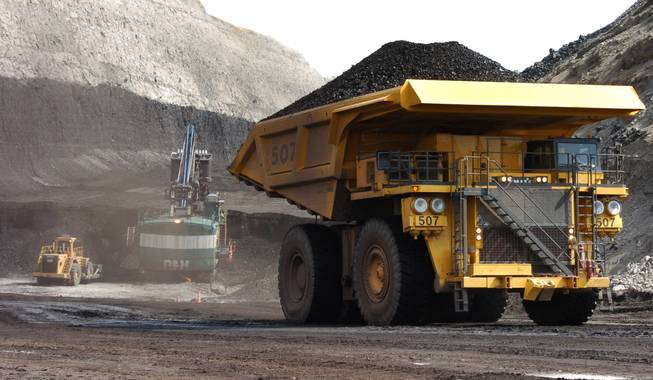
Matthew Brown / AP
In this April 4, 2013, file photo, a truck carrying 250 tons of coal hauls the fuel to the surface of the Spring Creek mine near Decker, Mont. Congressional investigators have found problems with federal coal sales that a federal lawmaker says potentially cost taxpayers $200 million or more in lost revenue.
Tuesday, Feb. 4, 2014 | 9:47 a.m.
BILLINGS, Mont. — Congressional investigators have found problems with federal coal sales that might have cost taxpayers $200 million or more in lost revenue, a senator said Tuesday.
Citing a new report by investigators at the non-partisan U.S. Government Accountability Office, U.S. Sen. Edward Markey, D-Mass., called for the sales to be suspended until the problems are rectified.
More than 40 percent of U.S. coal production — or about 450 million tons a year — comes from public lands leased by the government to mining companies under the century-old Mineral Leasing Act. Those leases bring in more than $1 billion in annual revenue.
While exports of the fuel to lucrative Asian markets have surged in recent years, the rules for leasing government-owned coal have remained largely unchanged since 1990. That's stirred concerns that companies could be shortchanging taxpayers by buying coal cheaply from the government based on U.S. market prices and then selling it at a premium overseas.
A sweeping, 19-month examination of the Interior Department's coal-leasing program by the GAO revealed widespread inconsistencies in how the government values public coal reserves that are leased to private mining companies.
The GAO also found a near-total lack of competitiveness in the leasing program. Almost 90 percent of the 107 coal tracts leased since 1990 received just a single bid.
Without those problems, the government's coal sales could have brought in $200 million in additional revenue — and possibly hundreds of millions more, said Markey, who requested the GAO study in April 2012.
"Taxpayers are losing out so that coal companies can reap a windfall and export that coal overseas where it is burned, worsening climate change. This is a bad deal all around," Markey said in a statement released by his office.
Markey said the lost-revenue figure was based on his staff's analysis of recent coal leases detailed in a second GAO report not made public because of concerns it contained confidential business information. The program appears to have benefited a few coal companies that may have leased federal coal reserves at "bargain-basement prices," he said.
National Mining Association vice president Luke Popovich said Markey's claims on lost revenue were speculation.
"Where's the data?" said Popovich. "If we're seeking greater transparency from the (government), we ought to be seeking greater transparency from everyone making claims."
In response to the publicly released GAO report, the Interior Department said it already has begun implementing reforms within the coal-leasing program run by the Bureau of Land Management. The agency said it agreed with GAO's recommendations, including suggested improvements in its review of coal appraisals to bring in independent make the process more transparent
Most federal coal is in western states, and money derived from leases and royalties is split equally between federal and state governments.
The GAO's finding that the government has failed to keep pace with the shift to exports was in line with an investigation last year by the Interior Department's Inspector General's Office. That earlier probe, based on a more limited review of coal sales, estimated losses to taxpayers of $62 million.
The Ohio-based Institute for Energy Economics and Financial Analysis, a group with environmental ties, has pegged lost revenues at more than $30 billion since the early 1980s, when many of the rules governing the industry were last revised.
The Powder River Basin of Wyoming and Montana accounts for the overwhelming majority of the public coal sales, 90 percent of which involve four industry giants: Arch Coal, Peabody Energy, Alpha Natural Resources and Cloud Peak Energy.
Most of the fuel is burned in U.S. power plants. But as domestic sales have lagged because of competition from cheap natural gas, more U.S. coal has been shipped abroad.

Join the Discussion:
Check this out for a full explanation of our conversion to the LiveFyre commenting system and instructions on how to sign up for an account.
Full comments policy